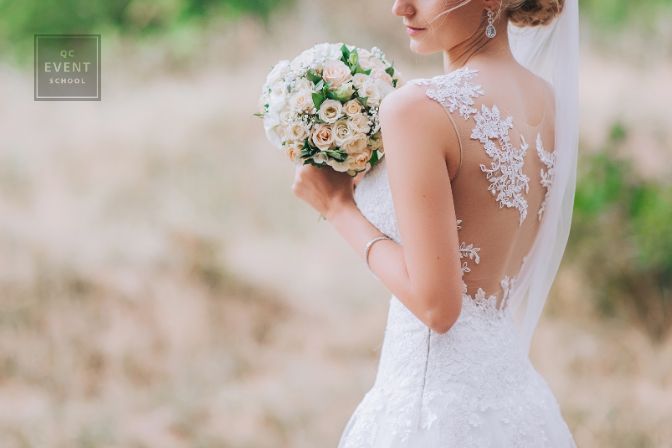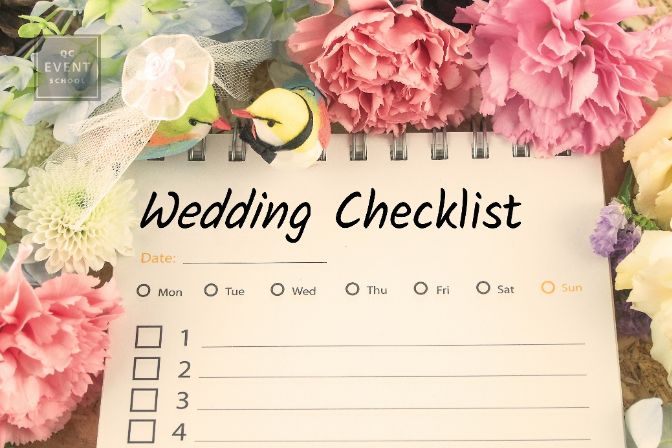
Business, Education, Your Event Career
A Day in the Life of a Wedding Planner
Dream of bringing the perfect nuptials to life? Sounds like you’re destined to become a wedding planner! But what does a day in the life of a wedding planner actually look like?
We’re here to tell you!
So, sit back and relax. By the time you’re finished reading, you’ll have a pretty clear idea of what your day-to-day responsibilities will look like in this industry. That way, you can decide once and for all if this profession is truly the right one for YOU!
How Do You Train to Be a Wedding Planner?
Okay, first thing’s first: you can’t start a successful career as a wedding planner without proper training. Because professional planning is an unregulated industry, what this means is that technically, you don’t need a certification or designation in order to work with clients. But don’t get it twisted! Those without an education under their belts will not succeed nearly as much as those with a proper background.
Here are just some of the biggest reasons why:
- The right certification – such as those provided to graduates of QC Event School – will be internationally-recognized. Thus, you’ll be able to work anywhere!
- Proper training is the only true way to arm yourself with the knowledge and subject-matter expertise needed to perform to the best of your abilities. From there, you can then elevate your skill-set through hands-on, real-world experience.
- You’ll have a better idea of how to distinguish yourself from local competitors, which will better your booking ability.
- Moreover, you’ll acquire an understanding of how to build your brand, set your service rates, hone your niche, and launch a functional business.
- Clients won’t want to hire a wedding planner who isn’t certified (and therefore, credible). It’s that simple.
How to Pick the Right Course
These days, there are all sorts of options at your disposal, both online and in-person. However, in light of the ongoing COVID pandemic, many have steered away from brick-and-mortar schools due to potential health concerns. One of the biggest lessons we all learned over the past two years is that distance learning definitely offers more than a few perks for those wanting to pursue their education in a safe, convenient environment.
Since online schooling is the new norm, we’ll focus on that in this article. However, if you’re the type of person who prefers learning in a physical environment, surrounded by your peers and instructor, then that’s okay, too. What we recommend in that case is for you to do as much research as possible into the brick-and-mortar options available in your area.
Perks of an Online Wedding Planning Course
In general, online schools tend to cater to a wider range of people than in-person schools do. For instance, you’re given the flexibility to access the same high-quality education – except you get to be in the comfort of your own home. Furthermore, distance learning is almost always cheaper than in-person schools, since there are no physical campuses or buildings to maintain.
Another benefit is that many online schools offer self-paced learning. QC Event School, for example, gives you two full years to complete your wedding planning program, starting on the date you enroll. However, during that timeframe, you can dedicate as much or as little time to your studies as you’d like.
For reference, many of QC’s grads found that they were able to graduate and earn their wedding planner certification in as little as 3-6 months, simply be devoting a mere 1-2 hour per week to their course!
Want to learn more about QC Event School’s self-paced, online courses? Here’s the full list!
What Are The Top Skills Every Wedding Planner Should Have?
Obviously, to thrive as a professional wedding planner, you need to be extremely organized. If you’re someone who puts everything off to the last minute and hates multi-tasking, this career won’t be the one for you. And, let’s be real, you probably wouldn’t enjoy it at all.
On top of organizational skills, you’ll need to possess a handful of other key traits as well. For example, you’ll need to be:
- A people person (at least, to some degree);
- Good at both communicating and listening;
- Creative;
- Up-to-date on current trends;
- Business-savvy;
- Able to keep calm under pressure;
- Smart with money and budgets;
- Capable of coming up with a lot of backup plans (and able to execute them at a moment’s notice);
- Understanding;
- Approachable;
- Flexible;
- Willing to put the effort into networking;
- A wizard with emailing, returning phone calls, etc.;
- And so much more!
While you don’t necessarily need to be a Type-A Monica Geller in order to have a fruitful career as a wedding planner, possessing the above traits and skills will DEFINITELY make you more likely to succeed!
What Does a Wedding Planner Do on a Daily Basis?
Look, I’ll be totally upfront with you: there’s no real “typical day” as a wedding planner. Depending on the client(s) you’re working with, the wedding you’re putting together, the timeline, and what all needs to be done, every event (and its process) can look different. That said, they all tend to share certain responsibilities, such as:
- Conducting an initial client consultation and follow-up appointments
- Ironing out the budget
- Creating the event concept
- Developing the guest list
- Sending out invites
- Figuring out decor (if you’re personally handling this)
- Contacting, conducting meetings/appointments with, and securing vendors and suppliers
- Answering a ton of emails, responding to voicemails, making all sorts of calls, etc.
- Determining the various timelines needed for the client’s wedding (e.g. 3-month timeline, 1-month timeline, day-of timeline, etc.)
- Creating emergency backup plans for a variety of possible scenarios
- Ensuring everyone is on the same page about everything
- Making sure the big day runs as smooth as possible
- Gathering client feedback and ensuring any outstanding payments to you/your business have been made
- And more!
With the above in mind, we do have first-person insight into an example day in the life of a wedding planner that we’d like to share with you. So, on that note, allow us to introduce you to QC Event School tutor and founder of Aisle Travel™, Amira Harris!
View this post on Instagram
Here’s What Amira Has to Say…
“If I’m working at my home office, my day usually starts at 8:00am with an extra large coffee and a pair of comfy clothes. By ‘comfy clothes’, I’m talking leggings, a t-shirt, no make-up, and messy hair (usually thrown up into a bun). Sure, it might not be pretty but it gets the job done.
On the days I work at home, I don’t see clients. Those days, I find I can really keep my head down and plow through work … I try to always finish my workday by 5:00pm, since a work/life balance is very important to me. However, it doesn’t always work that way – especially in peak season.
But when it’s not my busy time, I do shut down by my set time and use the evening to spend quality time with my family. Every wedding planner NEEDS to unplug and take advantage of the quiet when they can.”
Breaking Down Amira’s Day
“Every workday, the first thing I do is look at my task list,” Amira explains. “I always create this list at the end of the previous day. This way, it’s ready for the following day. Creating this list helps keep me organized. Plus, it also gives me insight of how much work needs to be done, so I can properly prepare myself.
By having a task list ready to go each day, I can hold myself accountable and remain on-track. I always start on the smallest tasks first, before checking my emails and voicemails. The large tasks will be done throughout the day. I usually start on one of my larger tasks after I’ve viewed my emails.”
Keeping Up with Correspondence
Amira continues: “I’ll listen to my voicemails and take note of who needs to be called back (and when). Once I finish that, I then conquer my emails. Some days, my emails can be overwhelming! On those days, I take a deep breath and just get to it.
Whenever you feel overwhelmed with emails, one tip I recommend is batching them into groups. This can make them feel easier to handle and reduce anxiety.
During a typical office day, I typically spend up to two hours reading and responding to emails. I’ll prioritize all urgent, pressing matters and reply to those first. Then I reply to all client emails, as well as emails that I can provide quick answers for off the top of my head. Everything else that requires research or planning work, I just leave in my inbox until that required work has been completed.
Most days, once I’ve gone through my emails, I’ll then start on my other tasks that were on my list. At that point, I’ll also add any new duties that I might now have (as a result of the emails). I’ll also return some phone calls at this point, if needed.”
Then It’s Time to Get to Work…
“The type of work I need to do during a typical office day will depend on the event I’m putting together, and what stage of the planning process I’m at,” Amira says. “For example, my day can consist of conducting research for some of the emails I handled earlier. I’ll likely also work on my client’s files. Depending on where we’re at in the planning cycle, that work can also potentially include:
- Putting a budget together;
- Developing a planning timeline;
- Securing vendors;
- Contacting resorts;
- Reviewing airline invoices;
- Or anything else that may need to be done for a client at that point.
The closer to the wedding date, the more a certified wedding planner like myself needs to do. I usually work on these tasks until mid-afternoon. Then I take a break to eat a quick snack or take my dog for a walk.
Taking regular breaks is critical during a typical office day! It gives your brain a chance to recharge and it gives you a chance to breathe.”
After Amira’s Break, It’s Back to the Grind!
“After my break, I check my emails again,” she continues. “This is when I’ll reply to the ones where I needed to do some research and/or provide my clients information and documents for their weddings. I also reply to any new emails that may have come in that require a quick response.
Personally, when I’m working, I don’t have my email open. I find that it can be very distracting otherwise, and I like to keep focused with the tasks at hand.
This approach might not for everyone, but it’s worth trying if you get a lot of emails and feel you’re getting unnecessarily sidetracked by them. Not having your email open constantly does require some discipline. No matter how swamped you are, you’ll need to be able to remind yourself to check them periodically throughout the day.
However, I find it works great for me and I get a lot more work done this way.”
Wrapping Up The Day
“At the end of the day, I review all of the tasks that were done,” Amira concludes. “I then put a task list together for the next day. As I mentioned earlier, this helps a great deal to set myself up for success.
Not to mention, it feels good to reflect back on what you have accomplished that day, while also knowing what still needs to be completed!”
Is Being a Wedding Planner Fun?
So, based on everything you’ve just read, you may be thinking, “This sounds like a lot of grunt work… Is the job ever actually fun?”
And the answer is a resounding YES! The fact is, if you love what you’re doing, being a wedding planner is one of the most exciting and enjoyable careers out there. Sure, some of the desk work might sometimes feel a little tedious. But you’ll still have fun doing it, because every step you take will bring you one step closer to making your client’s vision come to life!
What’s more, there’ll always be all sorts of hands-on work for you to do, too. This will likely be the aspect of your job that you love most, since you’ll get to really dive in and explore the depths of your creativity and imagination. Plus, nothing beats the feeling of seeing everything come together on the big day!
Is There a Demand for Wedding Planners?
Enjoying what you do is the most important thing – but obviously, if you want to make wedding planning your career, there needs to be a demand for your services, too. Otherwise, this endeavor will amount to little more than a hobby. And we know that’s not what you’re aiming for!
Luckily, we’ve got excellent news: the demand for wedding planners has never been greater!
According to The Wall Street Journal, “wedding planners and vendors across the U.S. report record numbers of inquiries and bookings through 2024[,] thanks to Covid-19 wedding postponements. According to projections from the wedding-planning website[,] The Knot, an estimated 2.6 million weddings will take place in the U.S. in 2022, a record high. Around the same number of weddings have been set in 2021, leading to vendors and venues finding themselves overbooked and, in some cases, increasing prices.”
And remember, this is just in the United States alone! Similar demand is being seen in various other countries all around the globe as well. What this basically means is: there’s never been a better time to start a career as a wedding planner!





Great information!
Many different words can be used to describe a day in the life of a wedding planner/coordinator. Hectic, exciting, creative, and organized are just some of the words used to describe this fast-paced career. While wedding planning provides plenty of hurdles in the form of demanding brides, unhelpful caterers, and booked venues, it can also be an extremely rewarding field. Wedding coordinating can be perfect for anyone interested in owning their own business, making their own hours, and using their creativity and organization at work everyday.
Hey Mark, thanks so much for the kind words, and for taking the time to read our blog post. We LOVE the summary you’ve provided in your comment, and we truly could not agree more. Very well put! <3
All the best,
The QC Team